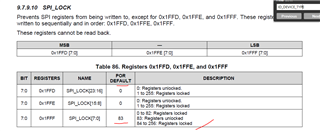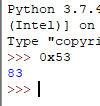Please see the attached picture to the reference from datasheet, as i understand the defult after power is that all registers are locked to spi write?
does it mean that the first register to be written is 0x1FFF with 0x0 to unlock all other registers to spi write option?
can we send each spi command once or we need few times as i saw in some spi logs of others
if i'm wrong in my above conclusion regarding locked register to spi write, can i use the next squence to read the product id from register 0x03?
0x000090
0x000010
0x000200
0x014A33
0x800300
i want to see the response of 0x06 on the RESET GPIO, is this squence right? cause now working with the EVB and sending this SPI squence not from the gui but from my implemented MCU it not gives me the 0x06 response



